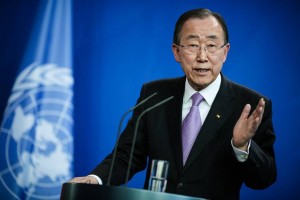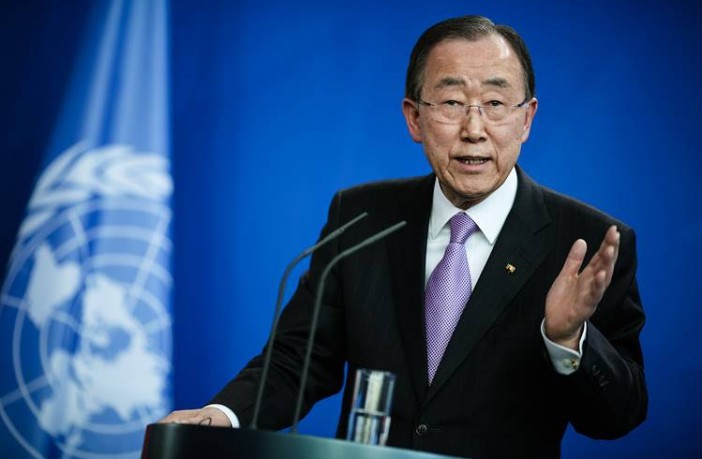The Wall Street Journal
by Ahmed Charai

Ban Ki-moon, by seeming to cheer on separatist rebels, betrayed the United Nations charter once more.
When United Nations Secretary-General Ban Ki-moon leaves office late this year, it will end an era of incompetence and malfeasance excessive even by U.N. standards. Meanwhile, he’s doing damage to my country, Morocco. His actions have set back efforts to broker a resolution to a long dispute in the Sahara, and triggeredThursday’s expulsion of some members of the U.N.’s peacekeeping mission in response to Mr. Ban’s politicized meddling.
Since Mr. Ban became secretary-general in 2006, his tenure at the U.N. has been pockmarked by failures both institutional and personal. U.N. peacekeeping forces now are more likely to stir fear than confidence, given their record of sexual predation in the Central African Republic over the past two years. The Ebola epidemic in Africa was made worse by the bungling of the U.N.’s World Health Organization. Mr. Ban himself was excoriated by five U.N. human-rights experts for trying to deny the world body’s responsibility for a disastrous cholera outbreak in Haiti in 2010. The secretary-general’s “opaque” hiring practices were denounced in 2011 by an internal U.N. report.
The man regarded as the world’s top diplomat also has a habit of pouring gasoline on burning international conflicts, In January, as a stabbing spree by Palestinian terrorists beset Israel, Mr. Ban remarked that it is “human nature to react to occupation.”
Two weeks ago, Mr. Ban waded into a less well-known conflict, in Morocco. For background: A leftist militia called the Polisario, based in and backed by the military establishment of neighboring Algeria, lays claim to half the territory of Morocco—the country’s Saharan south. Polisario waged a guerrilla war in the 1970s which never formally ended. Morocco’s monarch, Mohammed VI, has since invested billions into the development of the Sahara, so that it features glistening ports and infrastructure, decent housing and good schools. In the neighboring territory the Polisario patrols, the militia’s people still live in huts without running water or electricity, despite decades of generous international aid money from the U.N. and numerous charitable organizations.
The monarch’s plan for decentralization of governance kingdom-wide would grant Saharans self-rule. He also offers amnesty to militia members who agree to lay down their weapons. Such overtures have won an expression of formal appreciation by the U.N. Security Council, and been deemed “serious, realistic, and credible” by the Obamaadministration. The Polisario, offering no peace plan of its own, calls for continued “resistance.”
Enter Mr. Ban. On March 5 he visited Algeria and the Polisario camps in his official capacity and threw off the mantle of peace broker to become a party to the conflict. He declared Morocco a “colonizer” and an “occupier,” and flashed a “V” sign with the guerrilla fighters—which they understandably interpreted as a show of U.N. solidarity with their military campaign.
Mr. Ban’s actions should not be surprising. He has taken a neutral stance as Syria’s Bashar Assad killed nearly 500,000 of his own people. He stood on the sidelines as Russia’s Vladimir Putin invaded and annexed Ukraine’s Crimea. He oversaw toothless peace talks in Libya as the country collapsed into a failed state of multiple civil wars. Yet in Morocco, a conflict for which the U.N. itself has recognized the merits of a comprehensive settlement proposed by Morocco, he has effectively encouraged the perpetuation of armed struggle.
After Mr. Ban’s “occupation” remarks, Moroccan Saharans took to the streets of the southern provincial capital of Laayoune. Some 180,000 people marched in peaceful protest to the headquarters of the United Nations Mission for the Referendum of the Western Sahara (Minurso). The government denounced Mr. Ban’s actions and announced plans to reduce Minurso staff and pull Moroccan peacekeepers out of U.N. missions world-wide.
According to a U.N. statement, Mr. Ban “expressed his deep disappointment and anger regarding the demonstration” saying it was “disrespectful to him and to the United Nations.” This was a remarkable condemnation of a peaceful protest.
By stoking passions instead of acting as a peacemaker, Mr. Ban has undermined the credibility of the institution which Moroccans had accepted as a venue for peace talks, and in which they had placed their hopes. He has also further exposed his habitual betrayal of the U.N.’s founding charter.
Mr. Charai, the publisher of the Moroccan news magazine L’Observateur, is on the board of directors of the Atlantic Council and an international councilor of the Center for Strategic and International Studies.







